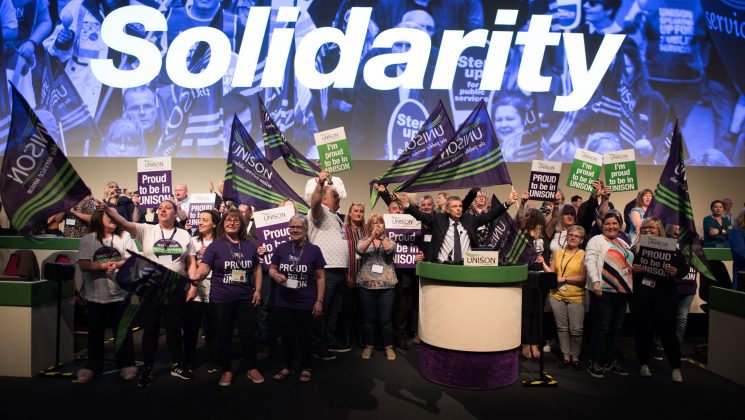National Delegate Conference is often referred to as UNISON’s parliament. It’s the place where thousands of our members come together from every branch in the country to debate the issues affecting public service workers and decide how UNISON will respond for the next year.
First-time delegate Laura Wilkes (Suffolk Area Health) reports on an “empowering and inspirational” experience.
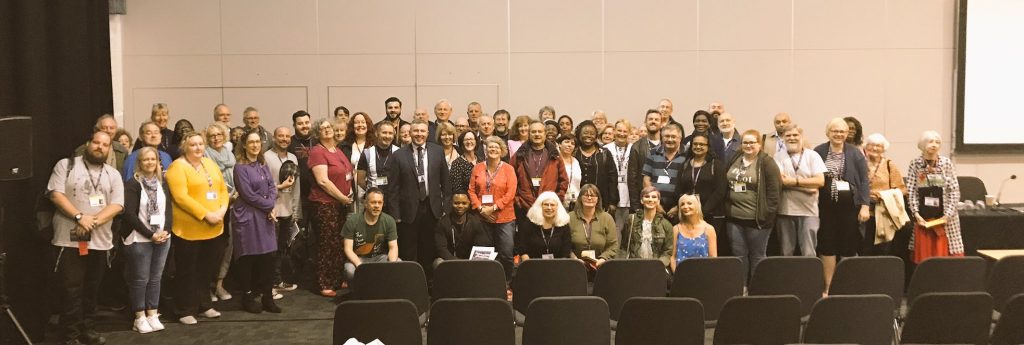
Delegates at the Eastern region pre-conference meeting
I attended my first National Delegate Conference (NDC) in Liverpool on 18-21 June, going up on the evening of 16 June to make the most of my first visit to both conference and Liverpool.
My hotel was close by the ACC Conference Centre on Kings Dock, where NDC was held, and close by a number of attractions of the redeveloped docklands – shops, restaurants, art galleries and other tourist attractions such as the Beatles Experience and Fab Four shop.
After an early morning run along the Albert Dock, I visited the International Museum of Slavery which was fascinating and moving, and then Tate Liverpool which was fabulous.
I popped into the conference centre, which was open for some service group conferences, to sort out my delegates’ badge. While there a woman from radical bookshop News from Nowhere recommended I visit the shop in Bold Street. As a librarian, I couldn’t resist!
I set off, with the aid of Google maps, to do the 30-minute walk to Bold Street and I’m glad I did. Although I passed through the popular shopping area, I also saw parts of Liverpool off the tourist trail. It’s a city brimming with history, much of it linked to the slave trade, and most of the grand buildings from that era, built on the profits from slavery, have survived and they are very beautiful.
I found the shop and spent a very happy hour browsing and purchasing. Then, on the recommendation of the bookseller, I made my way to Liverpool Central Library. This is an amazing building, both old and new architecture, and it’s gratifying to see a city that invests in public libraries. The library was packed with users of all ages and backgrounds and I had a lovely time wandering around and browsing.
Later, I attended the Eastern regional meeting to discuss regional policy on various motions with other delegates from across the region, while more seasoned delegates explained how the conference would work. Afterwards there was the chance to meet up with friends from the region at the Eastern region delegates meal in a local Italian restaurant.
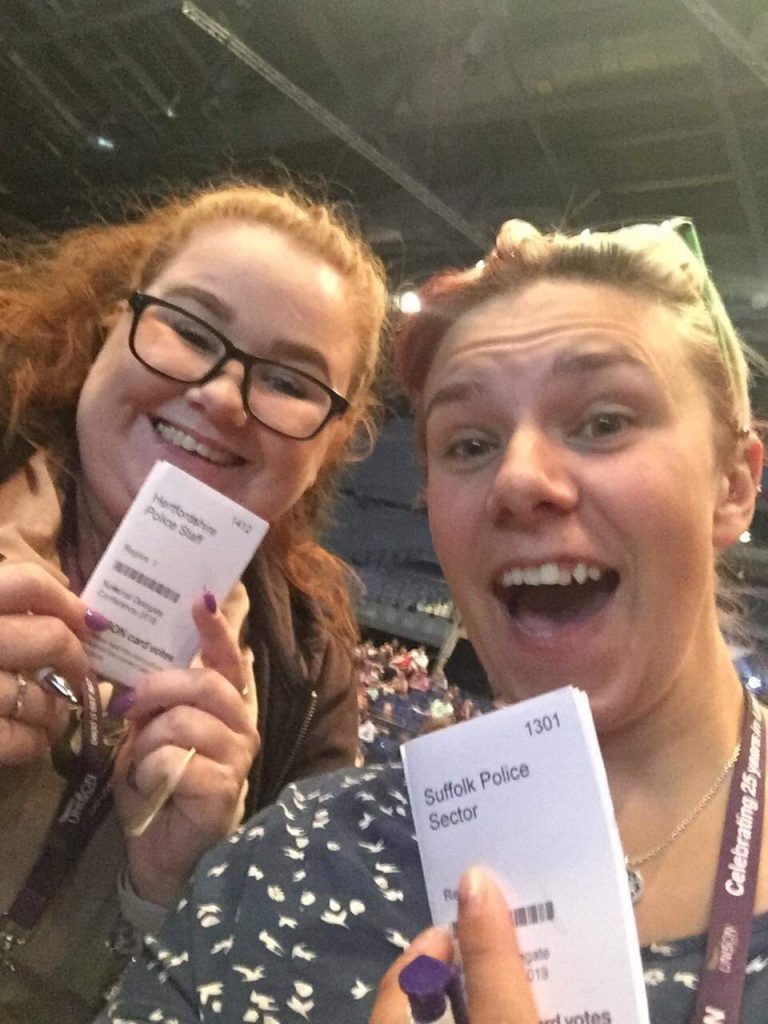
Police staff delegates enjoy their first card vote
Day one
NDC is comprised of delegates from all our service groups – health; local government; higher education; police and justice; community; water, environment and transport; and energy – representing workers from across the UK.
The agenda is huge: 131 motions plus emergency motions. The agenda is affectionately known as “the snake” and much time was spent over the course of the week in conversation with delegates about where we would get to on the snake.
Motions are not heard in numerical order. Each day an order of business is handed out as you enter the conference hall. Some motions are prioritised, then emergency motions, and then we revert to the order of business on the snake.
Your ID badge is scanned as you enter the conference hall to ensure you attend each session. If delegates do not attend, the region may be fined and this cost is passed on to the branch.
Suffolk Area Health had entered a motion, on the recommendation of regional secretary Chris Jenkinson, about using digital organising to reach members. This was Motion 4, but it wasn’t scheduled on the snake until the final day and it was virtually on the end of the snake’s tail.
I was due to move the motion, so although it was very unlikely to be heard, I spent some time writing my speech just in case it got called. On Day 2 the Eastern region had a vote on which motions to prioritise, but our motion was not chosen.
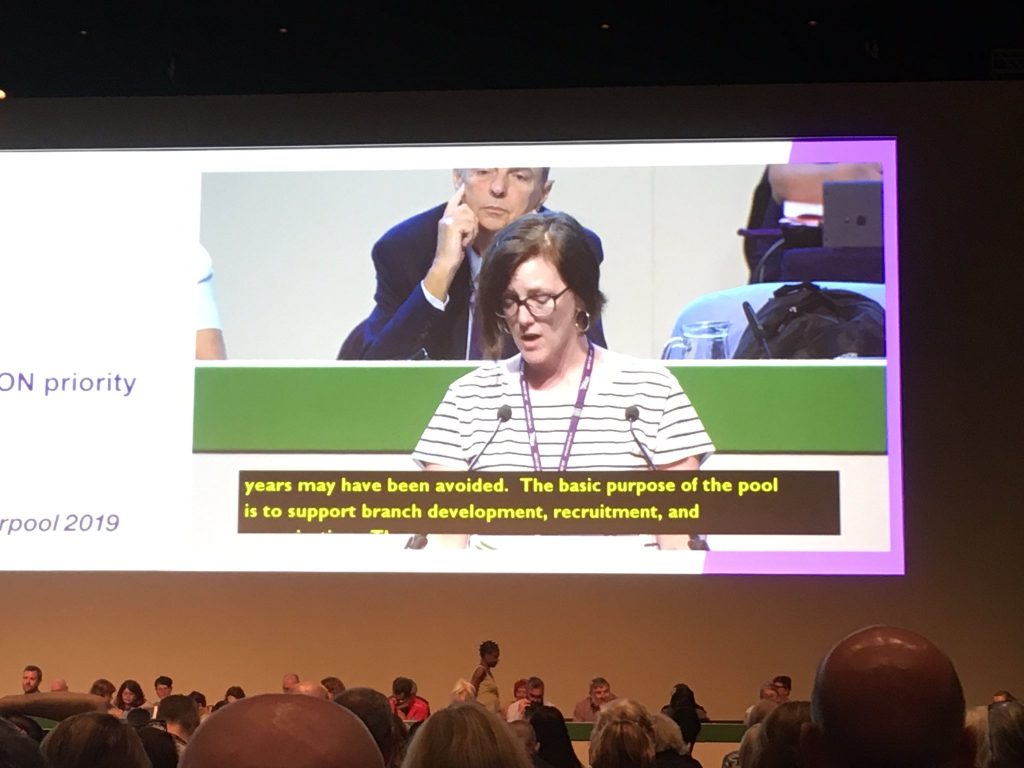
UNISON Eastern regional convener Becky Tye speaks on branch funding
Each day begins with a report from the standing orders committee (SOC), which oversees the running order for emergency motions, among other things. It decides if an emergency motion will be heard but decisions can be challenged and all delegates must vote on them.
I had never experienced a card vote – taken when the voting from the floor is so close that the chair rings a bell and calls a card vote or delegates call out for one – but the very first emergency motion had to be put to a card vote.
The very first emergency motion ended in a card vote being called as the decision of the SOC was challenged, so things got off to an interesting start.
In a card vote, you allocate your votes according to the membership of your branch and members’ opinions – if delegates agree the entire vote can go one way, but on this occasion, my fellow Suffolk Area Health delegate Sara Bland and I were not agreed so we decided to split the vote.
Sara had volunteered as a teller, so when the votes were collected she had to leave the conference floor and be closeted in a room with the other tellers to count the votes. The conditions are strict – if they need to leave the room, to use the loo for example, they must be accompanied.
Business is supposed to be suspended while the votes are counted, but as the agenda was so long conference agreed to press on. That meant that Sara missed some of the debates on other motions.
There was another card vote later on during NDC. It was useful to familiarise myself with the procedure and I will know what to do next time.
Some of the motions debated included justice for the Windrush generation and other motions concerning race and Black members.
We also had speeches from outgoing president Gordon McKay and UNISON general secretary Dave Prentis, which are always highlights for me.
I attended a lunchtime fringe event called Skills for Success which delivered the results of one of the largest education surveys ever undertaken in Europe, with over 38,000 responses, empowering union learning reps to embed learning in branches and organisations. One of the speakers was assistant general secretary Roger Mackenzie, who is a passionate advocate for education and campaigning and always a great speaker.
The findings from this survey, once they have been fully analysed, will help us to target effective learning in the workplace and to negotiate with the trust for learning opportunities.
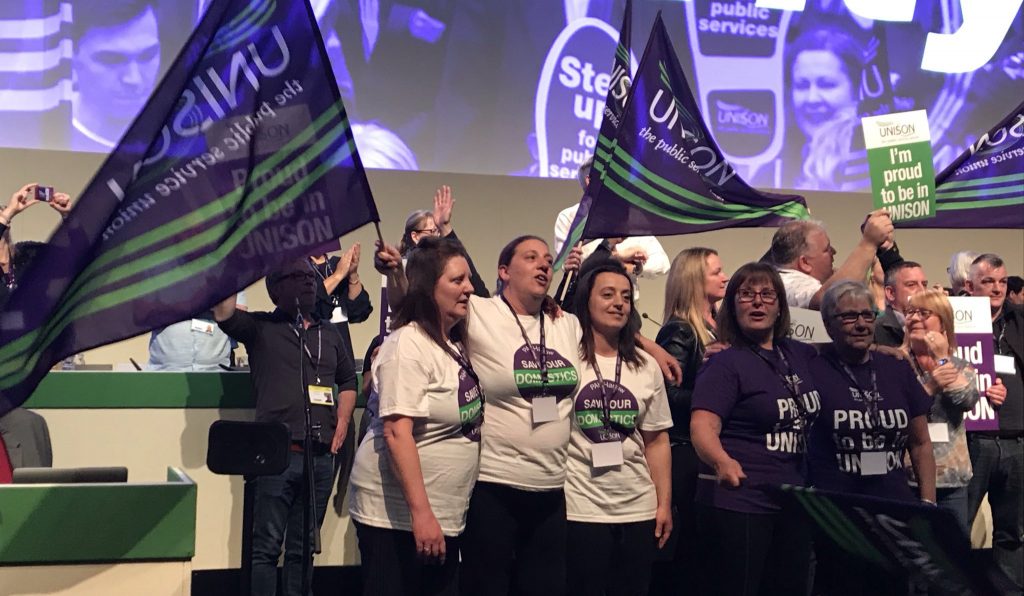
Princess Alexandra Hospital domestics join some of the other UNISON heroes from the last year
Day two
It was great to see so many speakers from our region, talking on motions ranging from safeguarding regional pool funding to celebrating our Young Workers Committee campaign around workplace sexual harassment, Uncomfortable Yet?
There was also a very rousing speech by Dave Prentis celebrating the many successes our members have had in strike action this year, particularly around care workers and hospital domestics fighting to keep services in-house in the NHS. The unspoken theme of NDC was “Solidarity.”
Tributes were paid to those Reps who had passed away, by way of their names being displayed on a large screen. Our own Ally Dutton’s name appeared on the screen.
Later on, UNISON Eastern’s fringe meeting heard inspiring stories from the domestic workers at Princess Alexandra Hospital in Harlow, who were on the eve of walking out on strike to keep their jobs in the NHS when bosses scrapped privatisation plans. We also heard from the Doncaster Sodexo strikers who won pay parity with their NHS colleagues after repeatedly taking action.
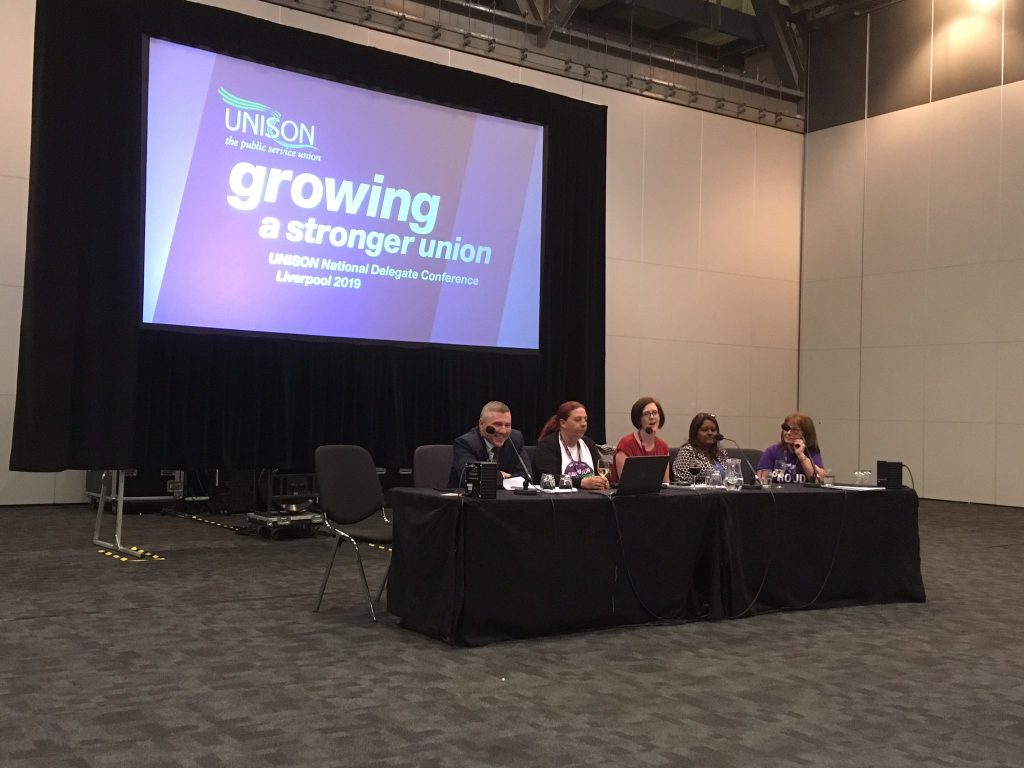
The UNISON Eastern fringe meeting on fighting NHS privatisation
Day three
One of the things that became apparent quite quickly is how long the snake is and how difficult it would be to have every motion heard. For this reason, there were many more points of order asking ‘that the question be put’ (effectively ending the debate) than at service group conferences.
As with other conferences, it’s sometimes difficult to appreciate where the debate is as many of the motions are reinforcing UNISON’s policy or our fundamental beliefs as trade unionists, but there were some controversies.
One of these concerned suicide awareness training for reps: the National Executive Committee (NEC) had tabled an amendment effectively watering this down to general mental health awareness training. While such training is valuable and relevant, I felt that specific suicide awareness training should also be a priority for the NEC (which carries out the wishes of conference).
When this motion was heard, I felt moved to speak against the NEC amendment and got up to do so, joining the seats on the right in opposition. The vote was called long before I got a chance to speak, but the amendment was defeated so I was happy with that. That did feel like conference and our members were calling the shots.
A special part of this day was when UNISON president Gordon McKay paid a special tribute to West Suffolk’s own Ally Dutton. This was unusual, but he used the words we had sent to him and it was very moving to hear him speak about Ally.
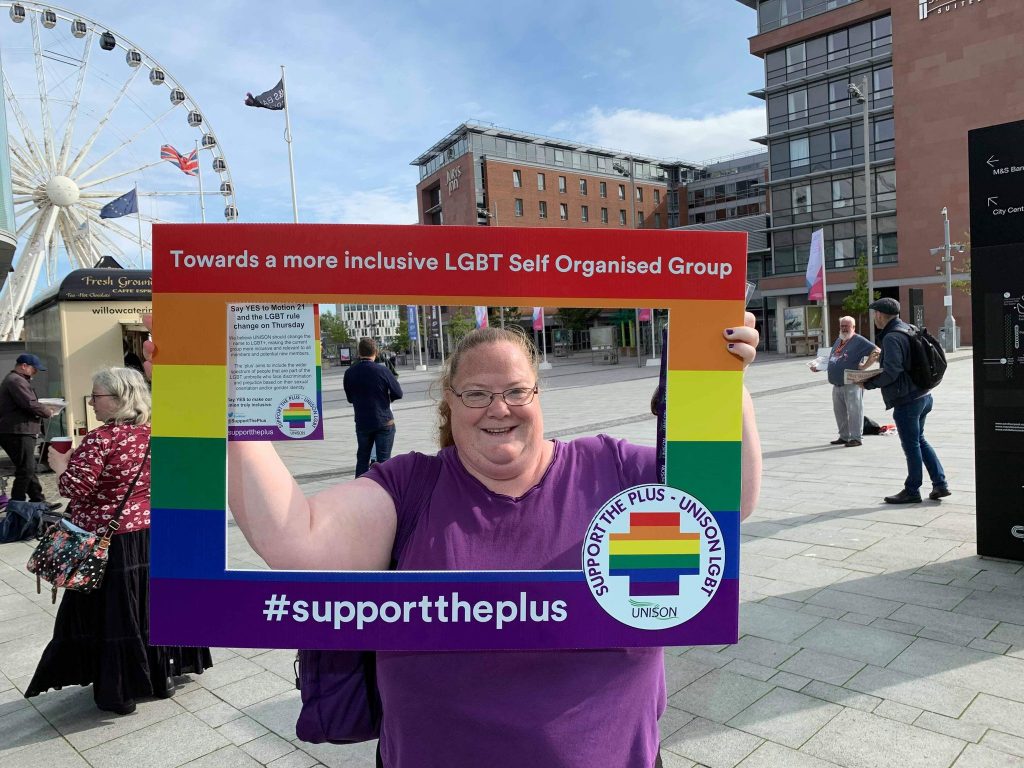
Delegates showed their support for the rule change adding a plus to the LGBT group to make it more inclusive
Day four
We had some very inspiring speakers at NDC and it was great to hear from so many inspiring and successful women. These included:
- Barbara Tanyanyiwa, national secretary of the Women’s Committee Zimbabwe Congress of Trade Unions, who spoke movingly of the struggle for trade union recognition in Zimbabwe and the dangers of being an activist;
- Patricia King, general secretary of the Irish Congress of Trade Unions, who set out the consequences of a no-deal Brexit for Northern Ireland;
- and Sonia Bassey, founder of the Mandela 8 Project in Liverpool, which was set up to empower communities in the city following the outpouring of grief at Nelson Mandela’s death in December 2013.
As the last day drew to a close it was clear our branch motion was not going to be heard and would fall off the end of the snake. But it was still a fabulous experience to be part of NDC.
As with health conference, NDC is a very full-on experience. There are around 3,000 delegates, many more than at health, and the agenda is packed. There are plenty of opportunities to engage in fringe events and we had many famous guests, including Labour frontbenchers Keir Starmer and Angela Rayner.
Once again, I found myself too tired after a day in the conference hall to engage in many fringe events, but I did spend a lot of time in the exhibition hall talking to various organisations, and I also spent some time with delegates and officials from the region.
I really enjoyed my first NDC and I felt I gained a much better understanding of how democracy works in the union. It’s a very empowering and inspirational experience for reps and I would urge all reps to attend and gain some experience of seeing how the union works on a national scale.

